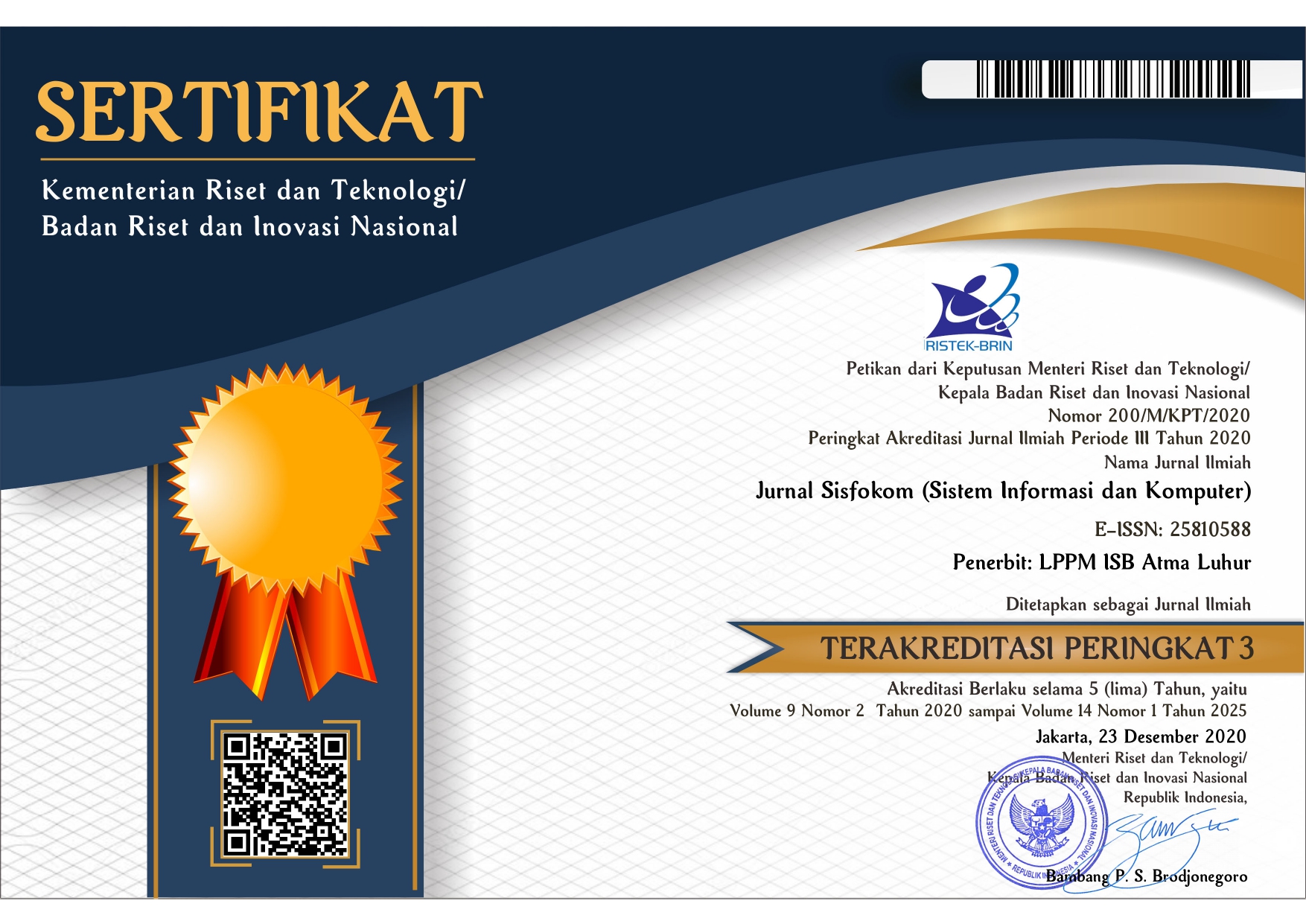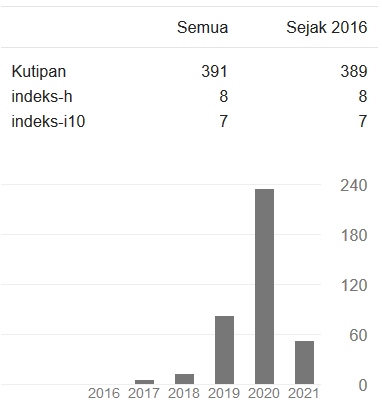Enhancing Smart City Maturity Through Digital Transformation: A Success Factors Analysis
DOI:
https://doi.org/10.32736/sisfokom.v14i1.2326Keywords:
Digital Transformation, Smart City Maturity, Success Factor, Best Practice, PRISMAAbstract
Improving smart city maturity through digital transformation is becoming increasingly crucial in facing the challenges of rapid urbanization and the need for more efficient city governance. However, the lack of a unified understanding of key drivers and challenges in this domain has limited the effectiveness of existing strategies. This study aims to explore the role of digital transformation in improving Smart City maturity by identifying key success factors and best practices adopted by cities worldwide. This study used the systematic literature review (SLR) methodology based on the PRISMA framework, which included systematic steps in selecting, collecting, and analyzing relevant literature. The study results reveal six factors influencing Smart City maturity: Information and Communication Technology (ICT) infrastructure, data integration, government policies and strategic planning, stakeholder engagement, environmental sustainability, and innovation and human resource development. Unlike previous studies, this study synthesizes global best practices and success factors, offering actionable insights for policymakers and practitioners to design inclusive, sustainable, and forward- looking digital transformation strategies. Furthermore, the study underscores the need for context-specific research to optimize implementation and drive meaningful progress in diverse urban settings.References
B. Anthony Jnr, “Managing digital transformation of smart cities through enterprise architecture–a review and research agenda,” Enterp Inf Syst, vol. 15, no. 3, pp. 299–331, 2021, doi: 10.1080/17517575.2020.1812006.
B. A. Jnr, M. A. Majid, and A. Romli, “A Trivial Approach for Achieving Smart City: A Way Forward towards a Sustainable Society,” 21st Saudi Computer Society National Computer Conference, NCC 2018, pp. 1–6, 2018, doi: 10.1109/NCG.2018.8592999.
S. Alawadhi et al., “Building Understanding of Smart City Initiatives,” in LNCS, 2012, pp. 40–53.
P. C. Verhoef et al., “Digital transformation: A multidisciplinary reflection and research agenda,” J Bus Res, vol. 122, no. July 2018, pp. 889–901, 2021, doi: 10.1016/j.jbusres.2019.09.022.
M. De Jong, S. Joss, D. Schraven, C. Zhan, and M. Weijnen, “Sustainable-smart-resilient-low carbon-eco-knowledge cities; Making sense of a multitude of concepts promoting sustainable urbanization,” J Clean Prod, vol. 109, pp. 25–38, Dec. 2015, doi: 10.1016/j.jclepro.2015.02.004.
R. A. Nugroho, S. G. Prakoso, K. N. Hidayati, and A. A. Rahmawati, “Smart Technology Maturity and Smart City Initiative: Is it inline? A case in Surakarta City,” APICS 2022 - 2022 1st International Conference on Smart Technology, Applied Informatics, and Engineering, Proceedings, pp. 75–78, 2022, doi: 10.1109/APICS56469.2022.9918743.
J. Liu et al., “Towards sustainable smart cities: Maturity assessment and development pattern recognition in China,” J Clean Prod, vol. 370, no. August, p. 133248, 2022, doi: 10.1016/j.jclepro.2022.133248.
M. A. Juniawan, P. Shandhyaduhita, B. Purwandari, S. B. Yudhoatmojo, and M. A. A. Dewi, “Smart Government Assessment Using Scottish Smart City Maturity Model: A Case Study of Depok City Muhammad,” in ICACSIS, IEEE, 2017, pp. 99–104.
H. P. Lu, C. S. Chen, and H. Yu, “Technology roadmap for building a
smart city: An exploring study on methodology,” Future Generation Computer Systems, vol. 97, pp. 727–742, 2019, doi: 10.1016/j.future.2019.03.014.
R. A. Afonso, K. Dos Santos Brito, C. H. Do Nascimento, V. C. Garcia, and A. Álvaro, “Brazilian smart cities: Using a maturity model to measure and compare inequality in cities,” in ACM International Conference Proceeding Series, Association for Computing Machinery, May 2015, pp. 230–238. doi: 10.1145/2757401.2757426.
K. Pangauw, F. Usman, and A. Yudono, “Smart City Maturity Level and Quality of Life Index in Manado City,” International Journal of Science and Research (IJSR), vol. 10, no. 8, pp. 182–186, 2021, doi: 10.21275/SR21722000019.
H. S. Firmansyah, H. Supangkat, A. A. Arman, and R. Adhitya, “Searching Smart City in Indonesia Through Maturity Model Analysis (Case Study in 10 Cities),” in The International Conference on ICT for Smart Society (ICISS), Bandung, 2017.
M. J. Page et al., “The PRISMA 2020 statement: An updated guideline for reporting systematic reviews,” International Journal of Surgery, vol. 88, Apr. 2021, doi: 10.1016/j.ijsu.2021.105906.
F. V. Aragão et al., “Smart Cities Maturity Model—A Multicriteria Approach,” Sustainability (Switzerland), vol. 15, no. 8, Apr. 2023, doi: 10.3390/su15086695.
C. Anschütz, K. Ebner, and S. Smolnik, “Size does matter: A maturity model for the special needs of small and medium-sized smart cities,” Cities, vol. 150, no. August 2023, p. 104998, 2024, doi: 10.1016/j.cities.2024.104998.
M. Nur, J. R. Batmetan, and H. K. Manggopa, “Smart City Maturity Level Analysis Using ITIL Framework,” vol. 299, no. Ictvet 2018, pp. 243–247, 2019, doi: 10.2991/ictvet-18.2019.55.
H. Bayraktar, D. Y. Bayar, B. Kara, and G. Bilgin, “Leveraging maturity assessment to choose the right applications for smart cities: Turkey’s approach,” International Archives of the Photogrammetry, Remote Sensing and Spatial Information Sciences - ISPRS Archives, vol. 44, no. 4/W3, pp. 137–142, 2020, doi: 10.5194/isprs-archives- XLIV-4-W3-2020-137-2020.
W. N. Bernal and K. L. G. Espitaleta, “Framework for developing an information technology maturity model for smart city services in emerging economies: (fsce2),” Applied Sciences (Switzerland), vol. 11, no. 22, Nov. 2021, doi: 10.3390/app112210712.
A. Damianou, A. Vayona, G. Demetriou, and V. Katos, “An actionable maturity planning model for smart, circular cities,” Cities, vol. 140, no. September 2022, p. 104403, 2023, doi: 10.1016/j.cities.2023.104403.
M. Lnenicka et al., “Transparency of open data ecosystems in smart cities: Definition and assessment of the maturity of transparency in 22 smart cities,” Sustain Cities Soc, vol. 82, no. February, p. 103906, 2022, doi: 10.1016/j.scs.2022.103906.
S. De Santana, É. D. O. Nunes, S. De Santana, É. De Oliveira, N. Smart, and C. Evaluations, “Smart Cities Evaluations through SMM Framework - Sustainability Maturity Model To cite this version : HAL Id : hal-03133364 Smart Cities Evaluations through SMM Framework- Sustainability Maturity Model,” 2021.
E. da S. de Santana, É. de O. Nunes, D. C. Passos, and L. B. Santos, “SMM: A Maturity Model of Smart Cities Based on Sustainability Indicators of the ISO 37122,” International Journal of Advanced Engineering Research and Science, vol. 6, no. 2, pp. 13–20, 2019, doi: 10.22161/ijaers.6.2.2.
I. Bouzguenda, C. Alalouch, and N. Fava, “Examining digital participatory planning: Maturity assessment in a Small Dutch city,” J Clean Prod, vol. 264, p. 121706, 2020, doi: 10.1016/j.jclepro.2020.121706.
Downloads
Published
Issue
Section
License

This work is licensed under a Creative Commons Attribution 4.0 International License.
The copyright of the article that accepted for publication shall be assigned to Jurnal Sisfokom (Sistem Informasi dan Komputer) and LPPM ISB Atma Luhur as the publisher of the journal. Copyright includes the right to reproduce and deliver the article in all form and media, including reprints, photographs, microfilms, and any other similar reproductions, as well as translations.
Jurnal Sisfokom (Sistem Informasi dan Komputer), LPPM ISB Atma Luhur, and the Editors make every effort to ensure that no wrong or misleading data, opinions or statements be published in the journal. In any way, the contents of the articles and advertisements published in Jurnal Sisfokom (Sistem Informasi dan Komputer) are the sole and exclusive responsibility of their respective authors.
Jurnal Sisfokom (Sistem Informasi dan Komputer) has full publishing rights to the published articles. Authors are allowed to distribute articles that have been published by sharing the link or DOI of the article. Authors are allowed to use their articles for legal purposes deemed necessary without the written permission of the journal with the initial publication notification from the Jurnal Sisfokom (Sistem Informasi dan Komputer).
The Copyright Transfer Form can be downloaded [Copyright Transfer Form Jurnal Sisfokom (Sistem Informasi dan Komputer).
This agreement is to be signed by at least one of the authors who have obtained the assent of the co-author(s). After submission of this agreement signed by the corresponding author, changes of authorship or in the order of the authors listed will not be accepted. The copyright form should be signed originally, and send it to the Editorial in the form of scanned document to sisfokom@atmaluhur.ac.id.









